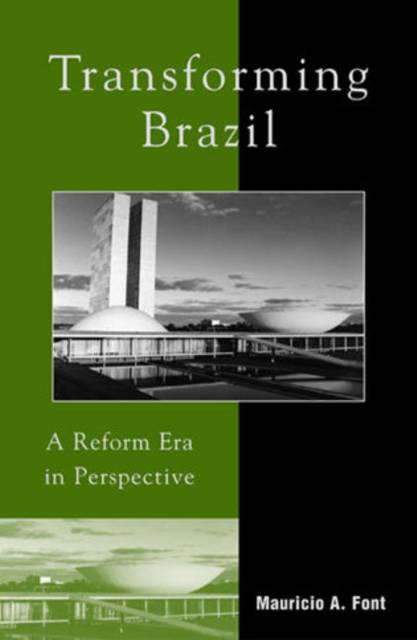
- Afhalen na 1 uur in een winkel met voorraad
- Gratis thuislevering in België vanaf € 30
- Ruim aanbod met 7 miljoen producten
- Afhalen na 1 uur in een winkel met voorraad
- Gratis thuislevering in België vanaf € 30
- Ruim aanbod met 7 miljoen producten
Zoeken
€ 153,95
+ 307 punten
Uitvoering
Omschrijving
Transforming Brazil explores the complex web of policies, ideas, institutions, social forces, and political actors behind recent Brazilian reforms. By placing them in a broader analytical framework, it sets the backdrop for a better understanding of the character, timing, and sequencing of the reform process. The focus is on the complex reform efforts during the post-1985 democratization era. The introductory chapters place Brazilian reform in comparative perspective and explore theories and accounts of the political, social and institutional context in which the reforms took place, the political process leading up to reforms, and the actors that influenced them, including elites, business, government, institutions and interest groups. The analysis of stabilization and economic liberalization weaves in accounts of policies and of Fernando Henrique Cardoso's election as president in 1994 and his re-election in 1998. The detailed study of privatization, deregulation, trade liberalization and opening of the economy, state and administrative reform, agrarian reform, changes in social security system, fiscal reforms, and related reforms during the eight years of the Cardoso government show that they amount to a turning point in Brazilian politics, even if several reforms remain incomplete. The analysis also points to factors shaping the reform process and the relationship between the reforms and vulnerability to external financial crises and shocks. Transforming Brazil explores the rise and flux of a restructured industrial economy, with expanding service and agricultural sectors. It traces social and economic indicators from the 70's to present, highlighting spatial and social differences. The chapter on social policy and collective action traces the history of the labor and landless movements. More broadly, it sheds light on how civil society and collective action influence agrarian reform and other reform process. The analysis also clarifies the nature of elite and popular support for the refo
Specificaties
Betrokkenen
- Auteur(s):
- Uitgeverij:
Inhoud
- Aantal bladzijden:
- 288
- Taal:
- Engels
Eigenschappen
- Productcode (EAN):
- 9780847683567
- Verschijningsdatum:
- 25/03/2003
- Uitvoering:
- Hardcover
- Formaat:
- Genaaid
- Afmetingen:
- 169 mm x 241 mm
- Gewicht:
- 485 g

Alleen bij Standaard Boekhandel
+ 307 punten op je klantenkaart van Standaard Boekhandel
Beoordelingen
We publiceren alleen reviews die voldoen aan de voorwaarden voor reviews. Bekijk onze voorwaarden voor reviews.











